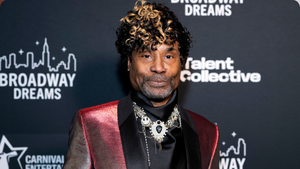The best friend to LGBTQ people in the history of ever, President Trump, decided last week that "he" would again ban transgender people from serving their country. The first time "he" attempted to ban them from the service, he announced it on a whim without consulting or notifying the Department of Defense. Several federal court injunctions blocked "his" attempt, so "he" returned to the drawing board to come up with another way to impose the ban that the DOD already researched and found unnecessary, drew up a plan for implementation, and was supported by the secretary of Defense.
I keep putting "he" in quotes whenever I refer to Trump because he has never been the driving force behind the ban. Vice President Mike Pence has always been the general leading the march against transgender service members; it's his way to force his beliefs on our military, a long-term goal of the evangelical Christian right.
For years, the Military Religious Freedom Foundation has noted the growing efforts by evangelicals to turn the U.S. military into an instrument of their ideology and worldview. While not all evangelicals believe the same, the far more radicalized tend toward a belief called dominionism -- a wish to turn America into a nation perhaps not run as a theocratic state but at least run by extreme Christian beliefs, the military included. Hence the reason Pence, with the help of the Family Research Council and the Heritage Foundation, produced a report full of bad anti-transgender science and myths in order to justify the ban. This is not the first time military policy and leadership have been guided not by military regulations and the law but by evangelical proselytizing and beliefs.
For instance, in 2005 it emerged that evangelical cadets at the U.S. Air Force Academy were being urged to proselytize their fellows, warning them they would burn in hell without Jesus. Other allegations included prayers during mandatory meetings, public shaming, and leaders teaching witness classes to cadets. At one point, 41 percent of non-Christian Air Force cadets reported unwanted proselytizing. The Military Religious Freedom Foundation discovered a video in 2006 used to promote Christian groups that was filmed inside the Pentagon and featured uniformed generals. An investigation found the film's purpose was misrepresented by an Army chaplain and listed numerous violations of DOD policy. The Army has come under extensive criticism for the inclusion of a spiritual aspect in its Comprehensive Soldier Fitness program, which evaluates soldier readiness, and has been accused of veiling the religious element with ambiguous language. Reports continually surface of soldiers being denied or threatened with a ban on reenlistment if they do not include references to God (which by regulation are optional).
Complaints are regularly filed by soldiers saying they have been ordered to attend religious events that were presented under the guise of being for morale and welfare. The foundation also found the Air Force units responsible for the launch of nuclear missiles were given a presentation that relied heavily on Christian teachings to give ethical justifications for the use of such weapons. One former service member called the presentation the "Jesus loves nukes speech."
On the Military Religious Freedom Foundation's website, example after example of reported religious harassment and preaching that exceeds military regulations can be found, along with numerous examples of religious groups such as Cru (formerly Campus Crusade for Christ) and Cadence International specifically targeting the military for recruitment. Groups like Cru believe in something called the "Great Commission," which comes from Matthew 28:19 and says to "Go and make disciples of all nations," and have stated a goal of turning the military into "government-paid missionaries for Christ."
A few years ago a religious network featured two Christian missionaries being embedded as "journalists" with the U.S. military in Afghanistan, using the opportunity to evangelize among the soldiers as well as the Afghan Muslim population. They missionairies said the military knew what their true intentions were, despite the prohibition on evangelizing in the area. According to Cru's own leaders and documents, the organization specifically targets military trainees as part of its "strategic goals" due to the pressure of the training environment. These young soldiers are told that by joining the military they are now ministers of God. This messaging is repeated in ROTC programs as well. Cru additionally targets soldiers deployed in combat, believing the trauma of combat creates a fertile environment for recruitment. These organizations have teamed up with groups like the Officers' Christian Fellowship, which seeks, in its words, to produce "a spiritually transformed U.S. military with ambassadors for Christ in uniform."
Family wellness programs such as the army's Strong Bonds often present themselves as marriage counseling and deployment support but are essentially religious retreats not only run by military chaplains but also with direct endorsement of the military. In military publications, overt religious proselytizing often appears, not by chaplains (who retain the ability to do so) but by regular soldiers, including in one instance a senior enlisted soldier from the Equal Opportunity Office.
Now, mind you, the U.S. military is not a secret militant order like an underground Knights Templar -- it is just that there is a strong interest by many dominionist-style groups to make it one, and they aggressively pursue any means to that end. For example, in 2011 the primary faith in the U.S. military was Catholic, at 20 percent, but only 8 percent of military chaplains were Catholic. And while just 3 percent of all service members identified as a member of an evangelical faith, 33 percent of all the chaplains did. The same year there were only 33 Jewish, Muslim, Buddhist, and other non-Christian chaplains for the entire armed forces (military bases often invite local ministers to offer services or direct soldiers to the local facilities). In my years of service I met people of all faiths, from Catholic to Muslim, Jewish, and even various pagan sects. In fact, the U.S. military allows Native American members to use peyote if their religious beliefs dictate and just recently designed a turban to accommodate Sikh service members.
One of my few remaining regular contacts from my time in service is one of my old unit chaplains, who used to have regular conversations with me about theology and philosophy (our first conversations were about the book of Zen koans I was reading at the time), and took to calling me "the unit's warrior poet." When the rumblings started about the renewed ban, I asked him about his experiences with evangelicals, to which he shared a screen shot of another chaplain who attacked him and his entire denomination for supporting LGBTQ service members. He recounted how many progressive chaplains are not happy with these evangelical chaplains using the service as a tool to discriminate. These evangelical chaplains, I was told, tended to come from Jerry Falwell's Liberty University until the Army began to no longer recognize Liberty's online accreditation program. At the same time, he let me know that during the years of "don't ask, don't tell," chaplains were usually the only source for closeted soldiers to receive emotional support in the service without fear of exposure. Indeed, many soldiers were out in all but name in those years and were protected by their command because they valued them. My old chaplain friend told me that many of the worst abuses, including the ones I mentioned above, are now receiving a strong crackdown in the service, and the military members doing much of the howling and protests against allowing trans (and gay) people to serve are increasingly marginalized evangelicals.
Pence and his friends at the Family Research Council, pushing the ban that the military was against, are part of an evangelical movement that sees this as a regained opportunity to carry out their "Great Commission." Trump is in all likelihood entirely apathetic about who can serve but feels pressure to appease his eager evangelicals, who have all but come to see him as little more than a useful idiot and a signature for their policies so that he can maintain a solid support base.
By banning transgender people and perhaps even in the long run looking for a way to reinstate DADT, evangelicals remove an obstacle to their goal of using the military as a tool for their ministries and do not have to face one of the more interesting challenges the service offers to their plan -- embracement of diversity. When people from all walks of life are put through emotionally intense events and are forced to work together, mutual respect is formed. Pro-trans vets and soldiers all say they don't care if transgender people service as long as do their job well, and if they are treated with dignity and respect, it can change the skeptics' minds about them. The trans ban is not about readiness and national security; it was always about a religious doctrine -- one that has slipped under our radar or we thought was defanged, but has returned with a vengeance now that it sees its last chance to make America and its military in its own image.
AMANDA KERRI is an Oklahoma City-based comedian and regular contributor to The Advocate. Follow her on Twitter @amanda_kerri.




































































Charlie Kirk DID say stoning gay people was the 'perfect law' — and these other heinous quotes